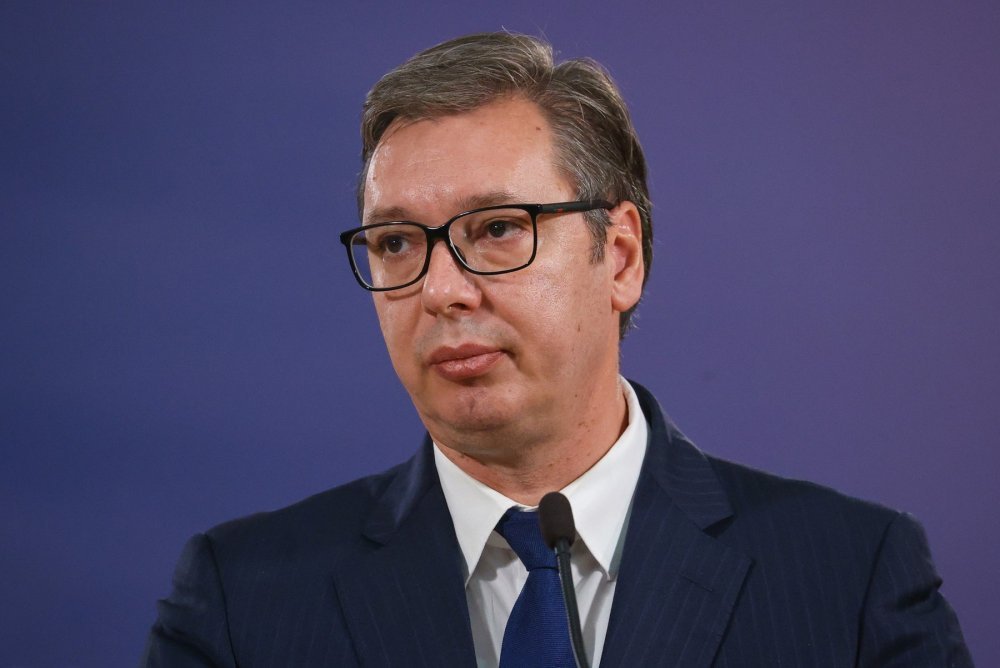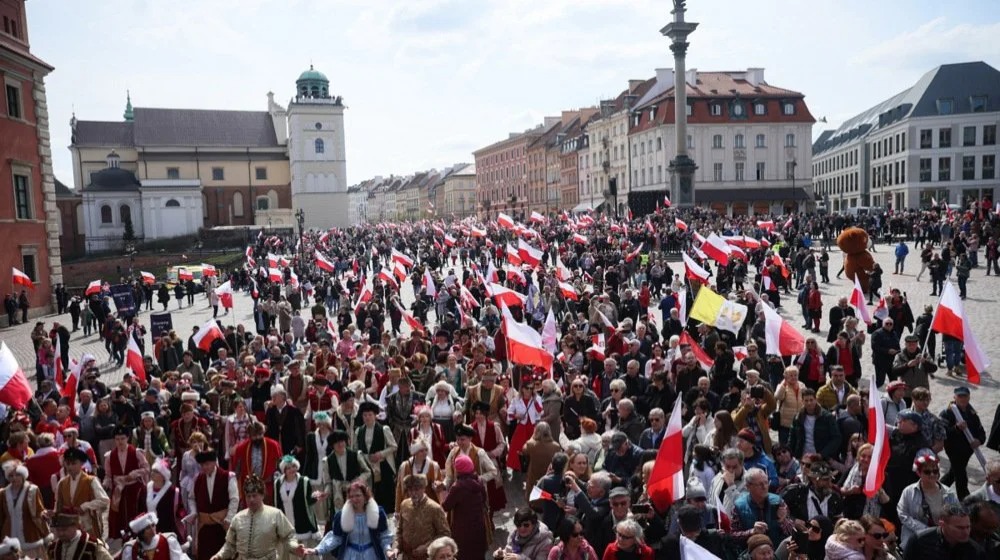
What Frankfurter Allgemeine Zeitung Writes About Vučić’s Relationship with Putin and the Konrad Adenauer Foundation?
In the German daily Frankfurter Allgemeine Zeitung (FAZ), journalist Michael Martens published an analysis entitled “False Friends,” dealing with the relationship between the authorities in Serbia and Russia, as well as the cooperation of the Konrad Adenauer Foundation (KAS) with the Serbian Progressive Party (SNS).
The article by Michael Martens is fully republished by N1:
Serbian President Aleksandar Vučić calls Putin an ally. That is why the European People’s Party questions the membership of his party. Should the Konrad Adenauer Foundation still cooperate with it?
Hardly any European head of government has recently spoken so clearly about the Russian dictator as Friedrich Merz. The statement of the German chancellor at the beginning of September, that Vladimir Putin was “perhaps the most serious war criminal of our time,” was not the first of its kind, writes Martens in his article for the German paper.
“Russia does not only threaten Ukraine, Russia threatens the entire peace, the entire political order of our continent,” Merz said before the NATO summit in June. And what the chancellor and CDU president says, the Konrad Adenauer Foundation cannot simply ignore. It is formally independent, but as with every party-affiliated foundation, it still belongs to that family.
KAS, as it is abbreviated, was founded in 1955 out of the “Society for Christian-Democratic Educational Work”, established by several CDU politicians. Since 2018, it has been led by former Bundestag president Norbert Lammert. The foundation is dedicated to strengthening democracy under a Christian-democratic framework. Like other party foundations, it is financed from taxpayers’ money and has built up a network of offices in Germany and abroad. It has 18 offices in Germany, more than 100 abroad in over 80 countries with about 1,000 employees. Every year, they organize numerous events and seminars with tens of thousands of participants. Thus, KAS also represents an image of Germany abroad.
It has been particularly strong for decades in Southeastern Europe. The work of 15 offices between Athens and Bratislava attracts much attention – and usually high praise. This especially applies to the six Western Balkan countries that are not EU members but aspire to join. Unlike in India or China, where German positions are barely noticed, the word of Germany still matters in the Balkans. The prestige of the EU’s largest economy also reflects on the offices of German foundations. Seminars and publications of KAS in Tirana, Sarajevo, and Belgrade are carefully followed. The scholarship program, which has supported thousands of young people over decades, is particularly popular and has significantly boosted many careers in the region. Montenegro’s president Jakov Milatović was a KAS scholarship holder. There are many other examples.
In Serbia, however – the largest of the six Balkan states with about six and a half million inhabitants – KAS is currently losing some of its reputation. There, it cooperates with SNS, the “Serbian Progressive Party” of the autocratic and anti-EU-oriented president Aleksandar Vučić. This is a dilemma for the foundation. On the one hand, since 2016 SNS has been an associate member of the European People’s Party (EPP), making it a natural partner in Serbia. On the other hand, this cooperation increasingly contradicts the foundation’s mission – strengthening democracy. It irritates those citizens of Serbia who care about the rule of law, separation of powers, and independent media – in short, a functioning democracy.
Vučić hopes that Putin will remain in power for many years. He sees Serbia and Russia as strategic partners fighting threats together.
Vučić and SNS, however, benefit from this cooperation. They systematically use it to suggest they are still highly valued in the West. At the celebration of 25 years of KAS in Belgrade in 2022, then Prime Minister Ana Brnabić praised the foundation as “one of the most important partners of the Serbian government.” Brnabić is a capable technocrat but also a hardliner in Vučić’s system of power. She called students protesting for months against Serbia’s political situation “terrorists,” while the president called his opponents “scum.” The government thereby sends a message to students through cooperation with Western organizations: you have no chance, the West is on our side.
SNS president and former prime minister Miloš Vučević met in May with the head of KAS’s Belgrade office, and pictures were immediately distributed by pro-government media. Vučević said that cooperation with the CDU remains “one of SNS’s foreign policy priorities.”
But Vučić’s real priorities for years have been more in Beijing and Moscow than in Berlin or Brussels. A symbol of this is Aleksandar Vulin, one of Vučić’s most loyal associates. He has been defense minister, police minister, coordinator of intelligence services, and deputy prime minister. At a meeting with Putin in September 2024, he conveyed “personal, cordial, brotherly greetings from President Aleksandar Vučić” and the wish for Putin to lead Russia for many more years. “Serbia and Russia are not only strategic partners, Serbia and Russia are true friends, and the threats facing both countries strengthen our need to fight together – even more organized and united,” Vulin said as police minister on behalf of the government. Recently, he spoke with former KGB chief Nikolai Patrushev about cooperation. “We are allies,” Vulin confirmed in March after Vučić’s conversation with Putin.
F.A.Z. asked KAS how it explains the fact that chancellor Merz calls Putin a war criminal and the greatest threat to peace in Europe, while the foundation of his party in Belgrade nurtures closeness with a government that sees Putin as an ally. A spokesman replied: “Since October 2022, cooperation with the ruling EPP party SNS has focused exclusively on political dialogue, during which different and critical positions are also articulated.”
However, little of these critical positions can be seen in Belgrade. When F.A.Z. asked leading figures in Serbia in writing what they thought of the cooperation between the Adenauer Foundation and SNS, the responses came quickly and in such numbers that only a small part can be mentioned here.
Sonja Biserko, president of the Helsinki Committee in Belgrade and for decades one of the best-known human rights activists, described the cooperation as part of a broader phenomenon: “Berlin has always considered Aleksandar Vučić a ‘stable partner,’ even though his anti-democratic and anti-European policies have been obvious for more than a decade.”
Under Vučić and SNS, Serbia has recorded democratic setbacks, while support for EU membership has dropped to a record low of 40 percent. Vučić and SNS treat the opposition, civil society, and independent media “as enemies to be destroyed – which, unfortunately, many in the EU notice only when Vučić starts using the same methods against their foundations, politicians, or journalists. It is finally high time for KAS to end cooperation with SNS,” said Filip Ejdus, professor of security policy.
Doctoral candidate Nevena Mijatović, a participant in a KAS scholarship event in early September, warned that KAS risks losing precisely the young people in Serbia it seeks to engage. “If KAS wants to remain an ally of Serbian civil society in developing democracy, its educational programs must openly address the authoritarian practices of the SNS regime and value acts of civic resistance,” she said. “Otherwise, the foundation risks losing the trust of young people or, even worse, unconsciously directing their loyalty to a regime that is destroying democracy.”
In the European People’s Party, the situation in Serbia is now being assessed more critically than before. “We are aware of what is happening, we see the pictures, we see what is going on,” said EPP president Manfred Weber on Tuesday. “EPP does not close its eyes to what is happening in Serbia, and that is why, as president, I will initiate proceedings against Vučić and his party’s membership in our family. This will happen in the coming days.”
Many Serbian citizens, who value a democratic future and potential EU membership, hope that KAS will follow this example and end its partnership with SNS.





